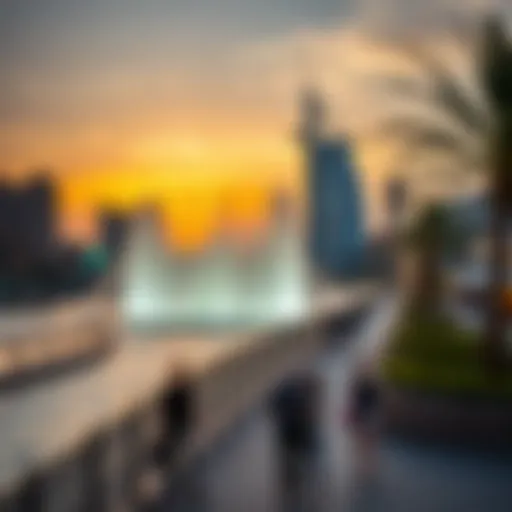The Importance of Ramadan Holidays in the UAE


Intro
Ramadan holds immense significance in the UAE, serving not just as a time for reflection and spirituality but also influencing various aspects of daily life and commerce. This holy month is characterized by fasting, prayer, and community, creating a unique atmosphere that touches every corner of society. As the sun sets each day during Ramadan, the air practically buzzes with anticipation as families and friends gather to break their fast, a moment known as Iftar. The cultural richness of this observance offers a fascinating backdrop to understanding its broader implications on lifestyle, business, and even the real estate market throughout the UAE.
The month of Ramadan is not only a spiritual journey but also a period that directly impacts business operations. Many companies adapt their hours and activities, anticipating changes in consumption patterns, while property management sectors monitor these shifts closely. Here's where our comprehensive examination of Ramadan's influence comes into play. Each element—from local traditions to investment strategies—is tied intricately into understanding the dynamics of life during this holy month.
This is especially crucial for stakeholders like investors, real estate agents, expatriates, and homeowners who may find the changes during Ramadan as both challenges and opportunities. By understanding the cultural practices and regulations surrounding Ramadan in the UAE, one can garner deeper insights, ensuring that decisions made during this time are informed and strategically sound.
In the following sections, we will delve into how Ramadan affects market trends and investment insights, equipping you with a robust understanding of this pivotal period in the UAE's cultural calendar.
The Significance of Ramadan in the UAE
Ramadan holds a place of profound importance in the UAE, intertwining rich traditions with the values of community and spirituality. Its significance goes beyond the surface of mere fasting; it influences cultural practices, social interactions, and economic activities within this vibrant nation. Understanding this significance sheds light on how Ramadan shapes the lives of both Emiratis and expatriates alike.
Historical Context
The roots of Ramadan in the UAE stretch back to the early days of Islam, when the holy month was first observed by the Prophet Muhammad. The historical significance of Ramadan in this region is deeply embedded within the bedrock of Islamic culture and the UAE's heritage. Traditionally, Ramadan marked a time of reflection, self-discipline, and devotion, traits that continue to resonate to this day.
As trade routes flourished across the Arabian Peninsula, the UAE emerged as a melting pot of influences. Historical accounts indicate that the observance of Ramadan was shaped by local customs and traditions, leading to a unique reflection of Islamic practices in both urban and rural areas. Today, the holy month showcases a blend of classical Islamic values with local customs, fostering a sense of unity and belonging among diverse communities.
Cultural Importance
Culturally, Ramadan weaves together the fabric of Emirati society. It symbolizes not only faith and piety but also the spirit of generosity and hospitality. Families gather to break their fast together during iftar, fostering stronger bonds and reinforcing social ties. This communal aspect is vital, especially in a multicultural society where expatriates from various backgrounds come together to celebrate, thus adding a rich layer of diversity to the observances.
During Ramadan, one can witness the streets of the UAE come alive with lively markets and communal Iftars. These gatherings serve as a platform for cultural exchange, where people share delectable dishes, stories, and experiences. Furthermore, the month is marked by cultural events, such as art shows and charity initiatives, that emphasize the values of compassion and community service. This cultural tapestry vibrantly illustrates the UAE's unique identity and orientation towards inclusivity.
Religious Observances
Religiously, Ramadan holds an esteemed position in the hearts of Muslims. Observing fasting from dawn until sunset is a primary tenet, but the month goes beyond refraining from food and drink. It is also a time for spiritual cleansing, prayer, and heightened devotion. The five daily prayers take on a more significant meaning, as many individuals also engage in Quranic recitation and more frequent attendance at mosques.
A noteworthy practice within this period is Taraweeh, special nightly prayers that take place during Ramadan. These prayers foster community spirit, uniting people in worship and reflection. Ramadan, therefore, is not simply a phase of abstaining but an opportunity for deepening one's faith and commitment to the teachings of Islam.
In the UAE, the religious observance of Ramadan reflects the public life as well. Government offices adjust their timings, allowing employees to balance their work and fasting duties. This practice underscores the UAE's respect for cultural and religious values, highlighting a societal commitment to an inclusive and supportive environment for all residents.
As Ramadan unfolds, it transcends individual observance, inspiring collective dedication, values of respect, and sincere efforts towards community welfare.
Ramadan Holidays in the UAE
Ramadan is not just a time of fasting and reflection; it’s a period that significantly influences the daily rhythms in the UAE. The holidays associated with this month blend religious observance and a rich tapestry of cultural practices, creating a unique atmosphere that permeates various aspects of life. Understanding Ramadan holidays is essential for anyone navigating the UAE’s social and economic landscape, particularly investors, agents, and expatriates, as these observances can influence everything from consumer behavior to real estate trends.
Public Holidays Schedule
The public holidays during Ramadan are regulated by the UAE government, ensuring that all sectors, including both public and private, observe the fasting month respectfully. Typically, the Eid al-Fitr holiday, which marks the end of Ramadan, is a time when families and friends come together to celebrate. Practically, the public holiday can stretch for up to several days, which not only allows for ample time to celebrate but also creates fluctuations in business operations.
Employers adjust working hours, usually reflecting a shorter workday. It's essential for businesses to be aware of these adjustments; understanding the public holiday schedule can aid in strategic planning. Businesses can expect both a rise in socializing during this time and shifts in consumer spending habits as families gather and celebrate in ways that resonate with their traditions.
Eid al-Fitr Celebration
Meaning and Traditions
Eid al-Fitr, which translates to the "Festival of Breaking the Fast," is an incredibly significant event in the Islamic calendar. Observed on the first day of Shawwal, following the conclusion of Ramadan, this holiday symbolizes not just the act of breaking the fast, but also the importance of community, gratitude, and giving. People dedicate themselves to charitable acts, reflecting the practice of zakat (charity), which is a vital component of the faith. This emphasis on generosity and family makes Eid al-Fitr a pivotal moment for many.
The traditional customs associated with Eid al-Fitr often feature communal prayers at mosques, festive meals, and giving of gifts, especially to children. Many families wear new clothes and decorate their homes, enhancing the festive spirit. The act of visiting friends and family highlights the importance of social bonds that are deepened during this time. Understanding these traditions is beneficial, essential for anyone engaging with the local culture.
Activities During Eid
Activities during Eid al-Fitr unfold with an air of festivity, characterized by various celebrations and events open to the public. From community feasts to funfairs featuring games and entertainment, the activities cater to a wide audience. Markets swell with people shopping for new outfits and traditional sweets, particularly maamoul, which visitors often enjoy. Adding to the festive mood are fireworks, which light up the sky in celebration.


Public events are crafted to bring communities together, blending festivities from different cultures, which is something to appreciate. These activities also provide a platform for local businesses to flourish, increasing their visibility and connection with the community. However, it’s important for newcomers and non-Muslims to approach these celebrations with respect and understanding of the guidelines surrounding the observance.
Community Involvement
Community involvement is at the heart of Ramadan and particularly during Eid al-Fitr. This time encourages unity among diverse groups, often leading to community outreach programs that foster togetherness. Many establishments organize charitable events, allowing individuals and businesses to participate in food drives or donate clothes to less fortunate families. This shared sense of purpose enhances social cohesion.
Local organizations often lead initiatives to boost community spirit, encouraging people to collaborate, engage, and foster deeper relationships. This involvement appeals to those looking for genuine connections within their neighborhoods, making it a valuable focus for the article. The unique feature of community involvement during this time is not just about charity; it’s about cultivating a sense of belonging and working towards common goals.
The essence of giving and coming together during Ramadan and Eid strengthens the bonds within the community, enriching the lives of all who participate.
In summary, understanding the details surrounding Ramadan holidays in the UAE equips investors, expatriates, and even local populations with the insight necessary to navigate the cultural landscape effectively. Whether it’s engaging with community events or understanding market dynamics, these holidays offer essential lessons in social relevance, cultural integration, and economic activity.
Lifestyle Changes During Ramadan
During the month of Ramadan, the lifestyle in the UAE undergoes significant alterations, impacting not only the daily routines of Muslims but also those of the entire community, including expatriates and visitors. Understanding these changes is crucial because they reflect the deep-rooted cultural significance of the holy month and its observance across diverse nationalities. The adjustments in lifestyle encapsulate altered work hours, heightened social interactions, and communal activities that foster a sense of unity and reflection.
Altered Work Hours
One of the most notable shifts during Ramadan is the change in work hours. The government's regulation typically reduces the standard working hours for both public and private sectors to about six hours a day, offering individuals the chance to observe their fast without the pressures of a full workday. This change isn't just a matter of personal convenience; it recognizes the physical demands of fasting and promotes a balance between professional commitments and spiritual practices.
In practical terms, this can mean that many offices will open later in the morning and close earlier in the afternoon. For expatriates adjusting to these new timings, it’s often a welcome change, allowing for personal reflection and family time. Additionally, businesses that cater to the community often adapt by extending their hours into the evening, accommodating those who break their fast late in the day. This shift sets a tone of flexibility and consideration, making it easier for everyone to engage with the holy month’s observances.
Social Gatherings
Social gatherings during Ramadan take on a heightened importance. The breaking of the fast, known as Iftar, is a communal event, emphasizing togetherness. Families and friends come together to share meals at sunset, and this sense of community is especially vibrant in the UAE. The blending of traditions, often infused with flavors from various cultures, offers a unique culinary experience during this time.
Iftar Events
Iftar events represent a significant cultural hallmark of Ramadan gatherings. These events range from intimate family dinners to large community celebrations in mosques or hotels. The key characteristic of Iftar events is the breaking of the fast with dates and water, followed by an elaborate meal that may feature local Emirati cuisine or international dishes catered to a diverse crowd.
- The advantage of Iftar events is the opportunity for cultural exchange, where guests experience a variety of foods and customs from different backgrounds.
- A unique feature is the community spirit that these events amplify; they are not just meals but are gatherings that foster relationships and understanding.
However, they can also present challenges, including logistical concerns for hosting large groups and the cultural responsibility to respect dietary restrictions. Understanding these nuances is key for expatriates and guests wishing to participate respectfully and meaningfully.
Cultural Exchange
Cultural exchange during Ramadan is another fascinating aspect that adds depth to the experience. Throughout the month, there are numerous initiatives and gatherings designed to promote understanding between different cultures. Restaurants and organizations may host events that welcome people from all walks of life to learn about Ramadan traditions while enjoying authentic flavors.
- The benefit of cultural exchange lies in its ability to break down barriers, inviting expatriates and locals alike to engage with the traditions and practices of Ramadan, all while building community relationships.
- A unique facet is the reciprocal sharing of experiences; many non-Muslims get the chance to understand the significance of fasting, charity, and prayer directly from their Muslim counterparts.
While cultural exchanges can enrich community ties, they may also require extra sensitivity to ensure that practices are shared respectfully and accurately, balancing enthusiasm with awareness to maintain the spirit of the month fully.
"Ramadan is not just about abstaining from food and drink; it's a time for building bridges, reflecting on gratitude, and deepening one's connection to the community."
In summary, the lifestyle changes during Ramadan significantly enhance the dynamics of social and professional life in the UAE. Understanding and embracing these transformations not only enriches personal experiences during this holy month but also contributes to a greater sense of unity within a diverse society.
Impact on the Real Estate Market
The real estate market in the UAE experiences distinct changes during Ramadan, influenced by cultural practices and lifestyle adaptations of the residents. Understanding these shifts is crucial for investors, agents, expatriates, and homeowners alike. The holy month not only shapes social dynamics but also creates unique opportunities for investment and development.
Market Activity During Ramadan
Investor Behavior
During Ramadan, there’s a noticeable shift in investor behavior. Many investors become more cautious and strategic about their transactions. With the holy month focusing on reflection and charity, decisions often shift from impulsive buying to more calculated long-term investments.
This is a time when investors pay close attention to the overall market sentiment and seek properties that can serve dual purposes, such as investment and lifestyle. They might be drawn to family-oriented developments or homes that offer access to communal resources, such as parks and schools, which cater to a more family-centric view during Ramadan.


Prospective investors looking to buy during this time can enjoy some advantages like less competition among other buyers, often leaving room for negotiation on property prices. Although, one should keep in mind the potential downside of market slow-downs as many sellers may prefer to wait until after the holiday to list their properties.
"Ramadan is a time of introspection, and this mindset applies just as clearly to property investments as it does to personal growth."
Property Listings
When it comes to property listings, the landscape can transform significantly during Ramadan. Many sellers can be hesitant to showcase their properties actively during the month, preferring to wait for Eid al-Fitr to kickstart new listings. Consequently, the selection of active listings can dwindle, potentially driving demand for what is available.
On the flip side, this period can represent an opportunity for savvy sellers who wish to get ahead of the curve. There is often a focus on niche segments, such as more affordable housing options or properties with added amenities that cater to families looking to expand their living situations. It’s essential for agents to guide their clients through these fluctuations, emphasizing the importance of timing and highlighting the unique features of available listings.
What investors should understand is that the seasonal approach can cause some properties to remain on the market longer, which is not always indicative of their value or appeal. Yet with patience and due diligence, buyers can find remarkable deals that may not be available outside of this month.
Opportunities for Investors
Ramadan, despite its slower pace, presents opportunities for investors to capitalize on various market dynamics. Some investors focus on properties that support commercial activities, such as restaurants or marketplaces, which see a surge in customer traffic due to the communal nature of Iftar. This can lead to promising returns on investment, creating a win-win situation for both landlords and tenants.
Moreover, with the focus on community and charity during Ramadan, initiatives such as affordable housing projects or partnerships with charitable organizations can align with investors' goals for ethical investment. The recreational, cultural, and historical significance observed during this season fosters a growing interest in community-driven developments that resonate with people’s values.
Economic Considerations
The economic landscape during Ramadan in the UAE undergoes notable shifts. This holy month is not merely a time for spiritual reflection; it also carries significant economic implications. Understanding these dynamics is vital for individuals, businesses, and investors alike. The importance of Ramadan in the economic context is intertwined with both consumer behavior and operational adjustments that surface during this unique period.
Business Adjustments
Many businesses in the UAE modify their operating hours during Ramadan to accommodate the fasting schedule of their employees and customers. This often translates to shortened working days. For instance, restaurants, shops, and offices generally open later in the day, aiming for increased foot traffic during the evening and night hours. This shift can lead to a notable increase in evening shopping or dining experiences, fostering a vibrant night economy.
Companies also promote special offers and discounts to attract customers who are looking to break their fast. These promotions not only cater to the heightened spending during the iftar evenings but also create a buzz around brands in a crowded market. Thus, businesses should carefully plan their strategies during this month to leverage the seasonal opportunities that arise.
Consumer Spending Trends
Consumer spending during Ramadan can see an uptick compared to other months, showcasing a unique blend of cultural and religious practices that drive behavior.
Ramadan Promotions
Ramadan Promotions are strategically crafted to resonate with the spirit of giving and celebration. Retailers around the UAE, from mega-stores like Carrefour to small local shops, run promotions that include discounts on food, clothing, and household items. These promotions are not just commonplace; they become an expectation among consumers eager to prepare for Eid celebrations.
Key characteristics of Ramadan Promotions often include:
- Discounts: Substantial price reductions on popular products.
- Bundles: Special bundle offers that provide added value and savings.
- Festive Packages: Items bundled in Ramadan-themed packaging that enhances the shopping experience.
A unique feature of these promotions is that they tap into the community spirit of Ramadan. They invite people to come together, share meals, and celebrate traditions, creating a sense of belonging. However, while these promotions can boisterously boost sales, businesses must ensure they remain true to the essence of the holy month—mindful consumption and charity are also important themes.
Charitable Contributions
Charitable Contributions hold a special place in the economic dynamics of Ramadan. Various initiatives arise during this month, encouraging both individuals and businesses to give back to the community. Many companies, recognizing the profound emphasis on charity in this period, engage in philanthropic activities, sponsoring iftar meals or donating portions of their profits.
The key characteristic of charitable contributions during Ramadan is the commitment to social responsibility. This commitment often shines through in initiatives such as food drives, fundraising campaigns, and community outreach programs.
The unique aspect of charitable contributions is their dual benefit:
- They help those in need, fostering community ties.
- They enhance the public image of businesses involved, establishing a sense of goodwill and trust among consumers.
“Charity does not decrease wealth.” - A common saying that resonates deeply during Ramadan and reminds us all of the value of giving back, not just for personal gain but for the good of the whole community.
Community and Charitable Activities
Community and charitable activities during Ramadan in the UAE reflect the very essence of the holy month. As the season of fasting begins, it's not just about abstaining from food and drink; it's also a time dedicated to giving, helping others, and strengthening community ties. This underlines the importance of compassion and support, values deeply embedded in Emirati culture and Islamic teachings.


Charity Campaigns
Charity campaigns play a pivotal role during Ramadan. Many organizations, businesses, and individuals come together to drive social change and provide support for those in need. For example, the UAE Red Crescent often spearheads major initiatives, encouraging donations and volunteering throughout the month. This climaxes in efforts to provide food packs, clothing, and financial assistance to the less fortunate. These efforts not only alleviate suffering but also foster a sense of belonging and unity across diverse social groups.
"In a nation characterized by its multicultural fabric, Ramadan offers a unique opportunity to bridge gaps and unite citizens through acts of kindness."
Additionally, various charitable organizations launch specific campaigns aimed at feeding families during Iftar. Initiatives like the 'Ramadan Tent' offer meals to expatriates and low-income households, promoting inclusivity and compassion among different nationalities residing in the UAE.
Social Responsibility Initiatives
Alongside dedicated charity campaigns, numerous corporations engage in social responsibility initiatives throughout Ramadan. Businesses often align their philanthropic efforts with the spirit of Ramadan, taking it upon themselves to contribute to community development. For instance, some companies have been known to provide sponsorships for community events or educational programs aimed at children.
Moreover, many firms employ the philosophy of giving back through employee engagement in community service projects. This not only enhances the company’s reputation but cultivates a culture of giving among employees. Staff members might volunteer at shelters, organize food drives, or partake in campaigns to collect essential goods for disadvantaged groups.
Through these acts of corporate social responsibility, businesses contribute significantly to the societal stability and welfare of the UAE during Ramadan. Not only do these initiatives support those in need, but they also help organizations establish themselves in a positive light, fostering brand loyalty and community trust.
In summation, community and charitable activities during Ramadan are not merely obligatory; they serve as a cornerstone of societal cohesion within the UAE. As various actors including individuals, businesses, and organizations mobilize their energies towards charitable giving and social responsibility, they promote upliftment and inclusion that resonate long after the holy month ends.
Cultural Sensitivity and Inclusion
In a nation as varied as the UAE, cultural sensitivity and inclusion during Ramadan are paramount. This holy month brings an opportunity for individuals, businesses, and communities to embrace the core values of empathy, understanding, and respect. It is precisely during this time that people can come together, regardless of their backgrounds or beliefs, fostering a spirit of solidarity and unity.
Respecting the cultural and religious practices surrounding Ramadan is vital. There are several reasons why this holds significance:
- Enhanced Community Relations: By acknowledging and respecting Ramadan traditions, expatriates and locals can engage in more meaningful interactions. This promotes cohesion and strengthens the bonds among diverse communities. Embracing these norms showcases the UAE's commitment to multiculturalism.
- Business Climate: Companies that show awareness of Ramadan's significance often enjoy a better reputation. This can enhance customer loyalty and attract clients from various backgrounds who appreciate sensitivity to cultural practices. Understanding that many of their employees and clients will fast can prompt a more compassionate approach to things like scheduling and promotions.
- Personal Growth: For individuals, being mindful during Ramadan can lead to personal enrichment. There is much learning that comes from engaging with different cultures and practices. When expatriates participate in iftar, for example, they not only break bread with others but can also immerse themselves in rich traditions, creating lasting memories and friendships.
"A little understanding goes a long way. In the rich tapestry of the UAE, each thread contributes to a beautiful whole, especially during Ramadan."
These aspects illustrate that cultural sensitivity is not simply about following rules but about embracing one another's ways of life, enhancing the communal atmosphere during Ramadan.
Respecting Ramadan Practices
Respecting Ramadan practices goes beyond not eating in public. It means understanding the essence of the month. This period is all about reflection, self-restraint, and spirituality. Here are some vital practices to be aware of:
- Fasting: Many Muslims abstain from food and drink from sunrise until sunset. Recognizing the strain this places on individuals helps cultivate a more supportive and understanding environment.
- Iftar: The breaking of the fast at sunset is a cherished moment. Many time-honored food traditions are associated with iftar, and welcoming others to partake in this meal strengthens interpersonal ties.
- Prayer: Increased religious observance during this month is common. Many individuals will spend more time at mosques, and this practice should be respected.
Being conscious of these practices allows for a more respectful interaction with Muslims throughout the month. It also aids non-Muslims in understanding the significance of Ramadan culturally and spiritually.
Engaging with Diverse Communities
Engaging with diverse communities is another integral aspect of cultural sensitivity during Ramadan in the UAE. The country is home to a mosaic of cultures, and during Ramadan, there is a heightened opportunity for collaborative exchanges.
- Community Activities: Many neighborhoods will host events that welcome everyone, regardless of religious affiliation. These could include communal iftars or charity drives.
- Cultural Sharing: Ramadan offers an excellent opportunity to learn about various customs and traditions from different countries. There are beautifully diverse ways in which Ramadan is celebrated worldwide, from the decorations in homes to traditional dishes served during iftar.
- Volunteer Opportunities: Many organizations ramp up their charitable efforts during Ramadan. Engaging in these activities not only boosts social responsibility but also provides a chance to meet people from all walks of life, creating bonds centered around the uplifting impact of giving back.
By taking part in such activities, non-Muslims can enhance their understanding of Ramadan and play an active role in the community's inclusiveness. This engagement ultimately fosters a harmonious environment where respect and shared experiences are cherished.
In a city like Dubai or Abu Dhabi, this kind of understanding and respect presents a chance to make meaningful connections that would otherwise remain unexplored. To embrace the spirit of the season, one must step outside of their comfort zone and participate in a way that honors the values at the heart of Ramadan.
Finale
As the holy month of Ramadan comes to a close, it's essential to reflect on its profound implications within the UAE. Beyond the rituals of fasting and prayer, Ramadan serves as a thread that unites diverse communities under shared values. This period is not simply a time for withholding physical nourishment; it's an invitation to cultivate deeper connections with family, friends, and neighbors. The essence of Ramadan transcends religious boundaries, showcasing a culture steeped in compassion and generosity.
Reflections on Ramadan's Role
Ramadan, in its essence, is a period of transformation and introspection. It prompts individuals to examine their lives, instilling values that resonate far beyond its 30 days. The profound impact of Ramadan can be observed in several dimensions:
- Spiritual Growth: The observance fosters a deeper connection with one's faith, encouraging reflection and spirituality.
- Strengthening Community Bonds: People come together to share iftar meals, breaking bread across cultures and fosterings communal harmony.
- Social Responsibility: Initiatives promoting charity and support for those in need flourish during this month, crafting a spirit of giving.
Ramadan also influences the economic landscape, shaping consumer behaviors and business operations. From special promotions to community events, businesses embrace the chance to contribute positively to society during this period. The custom of charitable giving influences the avenues of opportunities that arise from Ramadan, particularly in areas like real estate, where community engagement is essential.
Encouraging Understanding and Unity
The importance of understanding and unity during Ramadan cannot be overstated. For expatriates and native citizens alike, embracing the customs and practices of this month promotes inclusivity and respect. Here are some ways to further unity and understanding:
- Educational Initiatives: Employers can provide resources for learning about Ramadan to foster cultural awareness among expatriates.
- Community Engagement: Organizing interfaith dialogues or celebratory events that include everyone can bridge gaps and encourage mutual respect.
- Social Media Campaigns: Using platforms like Facebook and Reddit to share stories, experiences, and insights about Ramadan can enhance community visibility.











